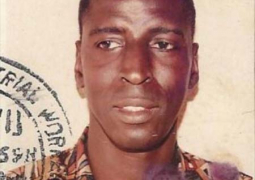
Nana Grey-Johnson has dedicated his life to writing, and is both a journalist and a writer. After completing his secondary education in The Gambia, he went to the USA to do a BA (Honors) in Mass Communication at Lewis and Clarke College, and then an MA in Journalism at Stanford University. He devoted himself to journalism from then on: he wrote articles and became editor of several newspapers and magazines. He is a former Minister of Information and Communication Infrastructure and presently the Founding Dean of the School of Journalism of the University of The Gambia. In this professional capacity, he established his literary vein, writing short stories and short texts (he would later write novels).
His first book, published under the pseudonym Nana Humasi, A Krio Engagement And Other Stories (116 pages) is a testament to this shift from journalism to literary writing. Published in Banjul in 1987, when the author was 36 years old, this book is a collection of 9 short stories, 7 of which have already been published in West Africa. However, putting these short stories together allows the author to enter literature (he had already made his first steps in the magazine Ndanaan). The nine short stories range from 5 to 21 pages, each with an illustration, and the sixth of them gives the collection its name. The subjects are diverse: the story of a man thought to have drowned who returns home to Bathurst in 1946 to attend his own funeral organised by his family (The Man Who Came To His Own Requiem); the fall of a man, Bangura, into alcoholism as a result of a romantic disappointment (Silent Crosses); the end of the old wars between Jola and Mandinka (For Warriors Only); the love affair of a handsome trumpeter, interrupted by the Second World War and otherwise rekindled after his return from the front (The Trumpeter); the harsh living conditions of the peasants, especially in times of drought when they wait impatiently for the rain (The Wicked Earth) the ceremonies that seal the union between a young man, Charles, and his future wife, Ajua, according to traditional customs (A Krio Engagment); the difficult realisation of a man, Bojang, who has committed many injustices and evil deeds in his life in order to get rich (She); the disappointment of a man, Johnson, who has just lost an election he had won many times before (Maybe Next Time); the painful delivery of a woman at home, between gunfire and bombs, during a violent battle between soldiers (Weekend In July). Nana Grey-Johnson paints a variety of situations, both in the city and in the countryside; in the past and in the present.
While Gambian authors have published short stories here and there, this collection is the first of its kind to be published in The Gambia. It is an important landmark in the history of Gambian written literature. He made a revised and an improved version of the book which is available for sale.
Eight years after publishing A Krio Engagment and other Stories (1987), Nana Grey Johnson submitted another collection of short stories in 1995, entitled The Children of the Spyglass. This 75-page book (published in The Gambia) contains three short stories, presented in chronological order.
The first, The Snake Man (10 pages), was read on the BBC in 1988 and again in 1992 in a selection of the best short stories. It is a reflection on those who claim to have the knowledge they do not have and abuse others in this way. A young boy, Alpha, will lecture Morikebba, another boy of his age group, who thinks he is the best of all, through an event they are confronted with, which involves a man, allegedly a master of snakes of the worst kind and the holder of a means to cure all bites. In front of the ignorant villagers, this snake master shows off his knowledge and power and sells the miracle drug that can save anyone from reptile bites. But the demonstration fails, and the deception is exposed. The man is only an apprentice in the field and tries to pass himself off as the one who teaches him how to tame snakes and of whom he is only the pretentious student. Alpha wins over the abused and frightened Morikebba.
The second story, Kumelo, Ship's Chandler (32 pages) was written in 1993 and is an adaptation of a famous storyteller, A. Auber. It is about a man, Festus A.B. Williams, whom people have nicknamed Kumelo. Our hero is in fact a small-time adventurer, one of whose activities is to load English ships (this is the colonial period) with legal and illegal goods (including alcohol). He gets by from day to day but accumulates debts with all his neighbours, including a woman in Newtown who serves him food and who does not intend to be constantly fooled. Several times he almost gets caught by the police, but each time he barely escapes, until he is caught for trafficking and swindling.
The third story, Children of the Spyglass (33 pages), won an award in the USA in 1994 and gives its name to the whole collection. A retired couple, modest and poor people, loving all the children in the area, have a rich, envious, miserly, single man as a neighbour. This cumbersome and wealthy neighbour first tries to take over their little piece of land, then gives up. For years he spies on the old couple with spyglasses and discovers that these poor old people have something he doesn't: they are happy and laugh with the local children. So, he wants to have what he doesn't have, but how can he get the laughter and happiness of life, even in poverty? When the old man and his wife understand the situation, they are the ones who will finally try to give him the gift of this treasure, which is the joy of living and loving.
These three short stories offer an opportunity to meditate on money, false pretence and the true values of life.
After writing two collections of short stories (A Krio Engagment and other stories in 1987 and Children of The Spyglass in 1996), Nana Grey-Johnson published her first novel in Banjul in 1998: The Magic Calabash. This book of 161 pages, divided into 14 chapters, is original, both in its subject matter and in the way the story is presented.
Erubami Roberts has been working as a courier in the Land Registry for the past 10 years, but he has just learned that, for budgetary reasons imposed by the World Bank, he has been "compressed". In other words, he is now unemployed. This situation does not help him because Modupeh, the young woman with whom he lives in a marital relationship (i.e. without being married) is pregnant. All he has to do is wait for his redundancy cheque, which is slow in coming. He can count on the friendship of his first cousin, Quashie, who works in an insurance company, but this is not enough to support a household. As bad things never happen alone, he is formally accused by one of his great aunts of stealing gold and jewellery from him. The police investigate. This accusation arouses Erubami's anger and he turns against Modupeh, whom he beats violently. The author has thus tied up the drama, but from ch. 4 onwards, the reader is drawn into a new situation. One evening when Erubami returns home after a fruitless day, he meets a small deformed being, a gnome (kondorong), with upturned feet. A fight ensues and Erubami only gains the hat of this strange little being. This episode seems to be forgotten, since we find the great aunt at the church (ch. 5), the cousin in the midst of political activity in the run-up to the municipal elections (ch. 6), etc. Now, unemployed as he is, Erubami decides to get married and regularise his marital situation. But with what money can he afford the ceremony and the party? The police are suspicious and take him to the police station on the night of the wedding. Modupeh, back at home, takes advantage of his solitude to open the small storeroom that Erubami has forbidden him to enter. Amongst her husband's unimportant belongings, she finds some money and a hat which she drops. Immediately, she is seized with pain which she attributes to her advanced pregnancy. She only regains her composure once she has put the hat back in its place.
Shortly afterwards, Erubami arrives with the police who force her to open the same storeroom. The police discover the money, and at the same time they learn that the great aunt's gold has been found. Erubami is therefore exonerated, but he has understood that his wife has discovered his secret: the hat is a magic calabash that gives money if it remains hidden. Then, things start to happen: the market burns down, there are lots of little gnomes in the streets, his wife is in pain when she gives birth to triplets, the police, and Erubami is the murderer of a policeman... At the end of the book, we realise that all this is just a bad dream of a sleeping unemployed person.
Nana has written several other works including Max the Cat (2015), The Story of the Newspaper in The Gambia (2004), and Edward Francis Small: Watchdog of The Gambia (2002:2022), I of Ebony, and many other works. He is the ghost writer of the book Kairaba by the first President of the Republic of the Gambia. He continues to write and mentor young writers.



